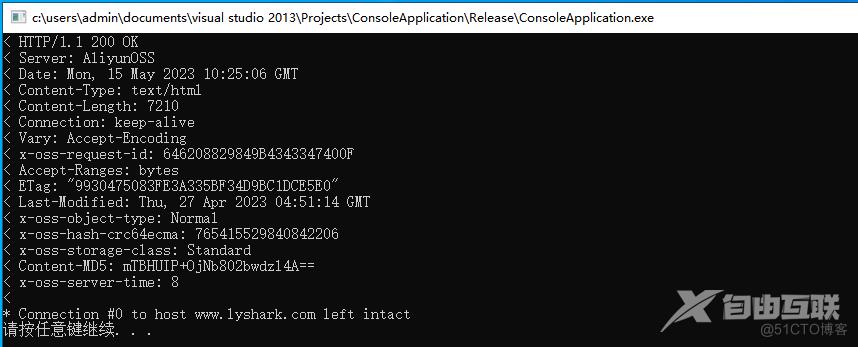LibCurl是一个开源的免费的多协议数据传输开源库,该框架具备跨平台性,开源免费,并提供了包括HTTP、FTP、SMTP、POP3等协议的功能,使用libcurl可以方便地进行网络数据传输操作,如发送HTTP请求、下载文件、发送电子邮件等。它被广泛应用于各种网络应用开发中,特别是涉及到数据传输的场景。
- 下载地址:https://curl.haxx.se/download.html
首先读者需要自行下载该库,如下笔者选择下载curl-8.0.1.zip这个源代码版本,读者可找到如下页面,并点击对应版本完成下载,当下载好以后读者可自行将其解压缩到任意目录下。

当读者解压缩后,可打开VS2013 开发人员命令提示并切换带该目录中的curl-8.0.1\winbuild目录,通过执行如下两条命令即可分别实现编译静态库或动态库,我们以静态库编译为主,执行如下命令读者可自行等待一段时间。
- 动态库: nmake /f Makefile.vc mode=dll VC=13 MACHINE=x86 DEBUG=no
- 静态库: nmake / f Makefile.vc mode = static VC = 13 ENABLE_IDN = no MACHINE = x86 DEBUG = no
这个库在编译通过后会自动生成文件到builds\libcurl-vc13-x86-release-static-ipv6-sspi-schannel目录内,读者可自行打开该目录,即可看到该目录内的头文件以及库目录文件,如下图所示;

读者可自行配置这个静态库,通常只需要配置include和lib文件即可,该库的使用很简单,首先我们需要调用curl_easy_init()函数对CURL对象进行初始化,接着通过调用curl_easy_setopt()并传入一个访问URL链接,当访问成功后则可调用curl_easy_perform()函数得到访问结果,这就是该库基本使用方法,如下代码。
#define CURL_STATICLIB
#define BUILDING_LIBCURL
#include <iostream>
#include "curl/curl.h"
#pragma comment (lib,"libcurl_a.lib")
#pragma comment (lib,"wldap32.lib")
#pragma comment (lib,"ws2_32.lib")
#pragma comment (lib,"Crypt32.lib")
using namespace std;
int main(int argc, char *argv[])
{
CURL *curl;
CURLcode res;
curl = curl_easy_init();
if (curl)
{
curl_easy_setopt(curl, CURLOPT_URL, "https://www.lyshark.com");
res = curl_easy_perform(curl);
curl_easy_cleanup(curl);
}
std::cout << "返回状态: " << res << std::endl;
system("pause");
return 0;
}
运行上述代码,读者可看到网站www.lyshark.com的源代码,如下图所示;

上述代码中的curl_easy_setopt()函数第二个参数可以使用多种类型的变量定义,我们可以通过传入不同的常量来定义请求头中的参数,例如当我们需要修改协议头时,可以使用CURLOPT_HTTPHEADER常量,并在其后第三个参数中传入该常量所对应的结构即可,这个结构体定义有许多类型,具体如下下表所示;
如下案例是一个简单的GET请求封装,通过调用GetStatus()函数实现对特定页面发起请求的功能,其中curl_slist_append()用于增加新的请求头数据,在调用curl_easy_setopt()函数时,分别传入了CURLOPT_HTTPHEADER设置请求头,CURLOPT_WRITEFUNCTION设置回调,CURLINFO_PRIMARY_IP获取目标IP地址,CURLINFO_RESPONSE_CODE获取目标返回代码,此处的write_data()函数直接返回0则表示屏蔽所有的页面输出内容。
#define CURL_STATICLIB
#define BUILDING_LIBCURL
#include <iostream>
#include "curl/curl.h"
#pragma comment (lib,"libcurl_a.lib")
#pragma comment (lib,"wldap32.lib")
#pragma comment (lib,"ws2_32.lib")
#pragma comment (lib,"Crypt32.lib")
using namespace std;
// 设置CURLOPT_WRITEFUNCTION回调函数,返回为空屏蔽输出
static size_t write_data(char *d, size_t n, size_t l, void *p)
{
return 0;
}
// 获取网站返回值
void GetStatus(char *UrlPage)
{
CURLcode return_code;
// 初始化模块
return_code = curl_global_init(CURL_GLOBAL_WIN32);
if (CURLE_OK != return_code)
{
return;
}
// 初始化填充请求头
struct curl_slist *headers = NULL;
headers = curl_slist_append(headers, "User-Agent: Mozilla/5.0 (Windows NT 10.0; Win64; x64; rv:76.0)");
headers = curl_slist_append(headers, "Referer: https://www.lyshark.com");
// 初始化请求库
CURL *easy_handle = curl_easy_init();
if (NULL != easy_handle)
{
// CURLOPT_HTTPHEADER 自定义设置请求头
curl_easy_setopt(easy_handle, CURLOPT_HTTPHEADER, headers);
// CURLOPT_URL 自定义请求的网站
curl_easy_setopt(easy_handle, CURLOPT_URL, UrlPage);
// CURLOPT_WRITEFUNCTION 设置回调函数,屏蔽输出
curl_easy_setopt(easy_handle, CURLOPT_WRITEFUNCTION, write_data);
// 执行CURL访问网站
return_code = curl_easy_perform(easy_handle);
char *ipAddress = { 0 };
// CURLINFO_PRIMARY_IP 获取目标IP信息
return_code = curl_easy_getinfo(easy_handle, CURLINFO_PRIMARY_IP, &ipAddress);
if ((CURLE_OK == return_code) && ipAddress)
{
std::cout << "目标IP: " << ipAddress << std::endl;
}
long retcode = 0;
// CURLINFO_RESPONSE_CODE 获取目标返回状态
return_code = curl_easy_getinfo(easy_handle, CURLINFO_RESPONSE_CODE, &retcode);
if ((CURLE_OK == return_code) && retcode)
{
std::cout << "返回状态码: " << retcode << std::endl;
}
}
curl_easy_cleanup(easy_handle);
curl_global_cleanup();
}
int main(int argc, char *argv[])
{
GetStatus("https://www.lyshark.com");
system("pause");
return 0;
}
运行上述代码,则可以获取到www.lyshark.com目标主机的IP地址以及页面返回状态,如下图所示;

当然该库同样支持POST请求方式,在使用POST请求时我们可以通过CURLOPT_COOKIEFILE参数指定Cookie参数,通过CURLOPT_POSTFIELDS指定POST的数据集,而如果需要使用代理模式则可以通过CURLOPT_PROXY方式来指定代理地址,
#define CURL_STATICLIB
#define BUILDING_LIBCURL
#include <iostream>
#include "curl/curl.h"
#pragma comment (lib,"libcurl_a.lib")
#pragma comment (lib,"wldap32.lib")
#pragma comment (lib,"ws2_32.lib")
#pragma comment (lib,"Crypt32.lib")
using namespace std;
bool SendPost(char *Url, char *Cookie, char *PostVal)
{
CURL *curl;
CURLcode res;
// 初始化库
curl = curl_easy_init();
if (curl)
{
// 设置请求头
struct curl_slist *headers = NULL;
headers = curl_slist_append(headers, "User-Agent: Mozilla/5.0 (Windows NT 10.0; Win64; x64; rv:76.0)");
headers = curl_slist_append(headers, "Referer: https://www.lyshark.com");
// 设置请求头
curl_easy_setopt(curl, CURLOPT_HTTPHEADER, headers);
// 指定URL
curl_easy_setopt(curl, CURLOPT_URL, Url);
// 指定cookie参数
curl_easy_setopt(curl, CURLOPT_COOKIEFILE, Cookie);
// 指定post内容
curl_easy_setopt(curl, CURLOPT_POSTFIELDS, PostVal);
// 是否代理
// curl_easy_setopt(curl, CURLOPT_PROXY, "10.99.60.201:8080");
res = curl_easy_perform(curl);
curl_easy_cleanup(curl);
}
return true;
}
int main(int argc, char *argv[])
{
// 传入网址 cookie 以及post参数
SendPost("https://www.lyshark.com/post.php", "1e12sde342r2", "&logintype=uid&u=xieyan&psw=xxx86");
system("pause");
return 0;
}
该函数的调用需要有一个POST结构才可测试,此处由于我并没有指定接口所有返回了页面错误信息,如下图所示;

接着继续实现下载页面到本地的功能,该功能实现的原理是利用write_data回调函数,当页面数据被读入到内存时回调函数会被触发,在该回调函数的内部通过调用fwrite函数将ptr指针中的数据保存本地,实现这段代码如下所示;
#define CURL_STATICLIB
#define BUILDING_LIBCURL
#include <iostream>
#include "curl/curl.h"
#pragma comment (lib,"libcurl_a.lib")
#pragma comment (lib,"wldap32.lib")
#pragma comment (lib,"ws2_32.lib")
#pragma comment (lib,"Crypt32.lib")
using namespace std;
FILE *fp;
size_t write_data(void *ptr, size_t size, size_t nmemb, void *stream)
{
int written = fwrite(ptr, size, nmemb, (FILE *)fp);
return written;
}
BOOL GetUrl(char *URL, char *FileName)
{
CURL *curl;
curl_global_init(CURL_GLOBAL_ALL);
curl = curl_easy_init();
curl_easy_setopt(curl, CURLOPT_URL, URL);
// 在屏幕打印请求连接过程和返回http数据
curl_easy_setopt(curl, CURLOPT_VERBOSE, 1L);
// 查找次数,防止查找太深
curl_easy_setopt(curl, CURLOPT_MAXREDIRS, 1);
// 设置连接超时
curl_easy_setopt(curl, CURLOPT_CONNECTTIMEOUT, 3);
// 接收数据时超时设置
curl_easy_setopt(curl, CURLOPT_TIMEOUT, 3);
if ((fp = fopen(FileName, "w")) == NULL)
{
curl_easy_cleanup(curl);
return FALSE;
}
// CURLOPT_WRITEFUNCTION 将后继的动作交给write_data函数处理
curl_easy_setopt(curl, CURLOPT_WRITEFUNCTION, write_data);
curl_easy_perform(curl);
curl_easy_cleanup(curl);
return TRUE;
}
int main(int argc, char *argv[])
{
// 下载网页到本地
GetUrl("https://www.lyshark.com", "./lyshark.html");
system("pause");
return 0;
}
当读者运行上述程序后,即可将www.lyshark.com网站页面源码,下载到本地当前目录下lyshark.html,输出效果如下图所示;

为了能解析参数,我们还是需要将页面源代码读入到内存中,要实现这个需求并不难,首先我们定义一个std::string容器,然后当有新数据产生时触发WriteCallback在该函数内,我们直接将数据拷贝到一个内存指针中,也就是存储到read_buffer内,并将该缓冲区返回给调用者即可,如下则是完整源代码。
#define CURL_STATICLIB
#define BUILDING_LIBCURL
#include <iostream>
#include <string>
#include "curl/curl.h"
#pragma comment (lib,"libcurl_a.lib")
#pragma comment (lib,"wldap32.lib")
#pragma comment (lib,"ws2_32.lib")
#pragma comment (lib,"Crypt32.lib")
using namespace std;
// 存储回调函数
size_t WriteCallback(char *contents, size_t size, size_t nmemb, void *userp)
{
((std::string*)userp)->append((char*)contents, size * nmemb);
return size * nmemb;
}
// 获取数据并放入string中.
std::string GetUrlPageOfString(std::string url)
{
std::string read_buffer;
CURL *curl;
curl_global_init(CURL_GLOBAL_ALL);
curl = curl_easy_init();
if (curl)
{
// 忽略证书检查
curl_easy_setopt(curl, CURLOPT_SSL_VERIFYPEER, 0L);
// 重定向
curl_easy_setopt(curl, CURLOPT_FOLLOWLOCATION, 1);
// URL路径
curl_easy_setopt(curl, CURLOPT_URL, url);
// 查找次数,防止查找太深
curl_easy_setopt(curl, CURLOPT_MAXREDIRS, 1);
// 连接超时
curl_easy_setopt(curl, CURLOPT_CONNECTTIMEOUT, 3);
// 接收数据时超时设置
curl_easy_setopt(curl, CURLOPT_TIMEOUT, 3);
// 写入回调函数
curl_easy_setopt(curl, CURLOPT_WRITEFUNCTION, WriteCallback);
curl_easy_setopt(curl, CURLOPT_WRITEDATA, &read_buffer);
curl_easy_perform(curl);
curl_easy_cleanup(curl);
return read_buffer;
}
return "None";
}
int main(int argc, char *argv[])
{
std::string urls = GetUrlPageOfString("https://www.lyshark.com");
std::cout << "接收长度: " << urls.length() << " bytes" << std::endl;
system("pause");
return 0;
}
如下图所示,则是运行后输出内存数据长度,当然我们也可以直接输出urls中的数据,也就是网页的源代码;

本文作者: 王瑞 本文链接: https://www.lyshark.com/post/6aa9753b.html 版权声明: 本博客所有文章除特别声明外,均采用 BY-NC-SA 许可协议。转载请注明出处!
